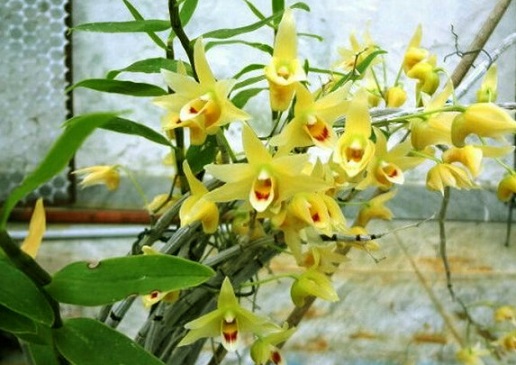Nikhil Prasad Fact checked by:Thailand Medical News Team Sep 30, 2024 6 months, 3 weeks, 5 days, 18 hours, 43 minutes ago
Herbs And Phytochemicals: Introduction to Dendrobium Polysaccharides and Their Importance
Polysaccharides extracted from plants have long been studied for their medicinal properties, but recent research focusing on the structural features of eight Dendrobium polysaccharides has revealed their potential in protecting the gastric mucosa. The study, conducted by researchers from the State Key Laboratory of Drug Regulatory Science at the National Institutes for Food and Drug Control in Beijing and the Anhui Institutes for Food and Drug Control-China, aimed to investigate how these polysaccharides can protect the stomach lining from damage, particularly when exposed to harmful substances such as alcohol.
 New findings on Dendrobium polysaccharides show promising gastric protection
New findings on Dendrobium polysaccharides show promising gastric protection
This
Herbs And Phytochemicals news report will explore the key findings of the research and shed light on how these polysaccharides work to enhance gastric protection.
Why Gastric Protection Matters
The stomach’s mucosal lining plays a crucial role in protecting the stomach from its own acid and harmful external factors. However, frequent exposure to alcohol and other toxins can lead to the breakdown of this protective layer, resulting in ulcers and even increasing the risk of gastric cancer. With alcohol consumption on the rise globally, particularly in many Southeast Asian countries, finding natural ways to protect the gastric lining has become increasingly important. This new study focuses on the ability of polysaccharides, particularly those found in Dendrobium species, to mitigate such damage.
Dendrobium and Traditional Medicine
The Dendrobium plant has long been a part of traditional Chinese medicine, often lauded for its stomach-strengthening properties. This medicinal use is now being validated by modern science. Polysaccharides are one of the primary bioactive components of Dendrobium, and they have shown potential benefits in gastrointestinal protection, immune regulation, and anti-inflammatory effects. Researchers in this study took a close look at eight different species of Dendrobium to evaluate their chemical structures and their effectiveness in protecting the gastric mucosa.
Study Methodology and Polysaccharide Extraction
To examine the properties of these polysaccharides, researchers collected eight Dendrobium species, including Dendrobium huoshanense, Dendrobium officinale, Dendrobium nobile, and several others. They used water extraction and alcohol precipitation techniques to isolate the polysaccharides, followed by high-performance liquid chromatography (HPLC) to identify the monosaccharide components. These methods revealed that the polysaccharides were primarily composed of mannose and glucose, with some containing small amounts of galactose and arabinose.
One of the key findings was the difference in polysaccharide structure across the eight species, particularly in terms of molecular weight and acetylation levels. Dendrobium huoshanense (DHP) had the lowest molecular weight, which was significant beca
use it translated into superior absorption and bioactivity.
Polysaccharide Effects on Gastric Mucosa Protection
To test the protective effects of these polysaccharides, the researchers used a model where human gastric epithelial cells (GES-1) were exposed to ethanol to simulate gastric damage. This is an established method for studying the effects of substances on the gastric lining. Cells pre-treated with Dendrobium polysaccharides, particularly at lower concentrations of 50 µg/mL, showed a remarkable ability to resist damage compared to untreated cells.
In fact, the protective effect of Dendrobium huoshanense polysaccharides (DHP) was notable, as it was able to maintain cell viability at nearly 97.32% of the control group. This suggests that even at low concentrations, DHP offers significant protection against alcohol-induced gastric mucosal damage.
Key Mechanisms of Protection
The study found that the polysaccharides worked by mitigating oxidative stress within the stomach cells. Oxidative stress, caused by an imbalance of reactive oxygen species (ROS), is a major contributor to gastric injury. By enhancing the activity of antioxidant enzymes such as superoxide dismutase (SOD), catalase (CAT), and glutathione peroxidase (GSH-px), Dendrobium polysaccharides were able to reduce oxidative stress and promote cell survival. This effect was particularly strong in the DHP group.
Additionally, the polysaccharides helped in reducing the levels of malondialdehyde (MDA), a marker of lipid peroxidation and cellular damage. The lower MDA levels in polysaccharide-treated cells further underscored the protective effect of these compounds.
Cellular Repair and Migration
Beyond simply protecting the cells from damage, the polysaccharides also promoted healing. In cell migration assays, which measure how quickly cells can move to repair a wound or injury, DHP and Dendrobium officinale polysaccharides (DOP) showed the best performance. After 48 hours, DHP-treated cells had repaired 83.13% of the damaged area, a significant improvement over the control group.
This indicates that Dendrobium polysaccharides not only protect against damage but also actively promote recovery, making them a dual-action therapeutic agent.
Understanding the Structure-Activity Relationship
One of the most fascinating aspects of the study was the correlation between the structural characteristics of the polysaccharides and their biological activity. Researchers found that Dendrobium polysaccharides with lower molecular weight and higher degrees of acetylation tended to exhibit stronger protective effects. The study suggests that these structural factors enhance the water solubility and bioavailability of the polysaccharides, allowing them to interact more effectively with gastric cells.
DHP stood out in this regard, as it combined low molecular weight with a moderate degree of acetylation, making it the most effective of the eight polysaccharides studied. In contrast, Dendrobium species with higher molecular weights or lower acetylation levels showed reduced efficacy.
Conclusion: A Promising Future for Dendrobium Polysaccharides
The findings of this study are a promising step toward the development of natural therapies for gastric protection. By identifying Dendrobium huoshanense as the most effective species for protecting the gastric mucosa, researchers have provided a foundation for future nutraceutical and pharmaceutical developments.
The ability of Dendrobium polysaccharides to reduce oxidative stress, promote cellular repair, and enhance antioxidant activity positions them as potential treatments for gastric ulcers, gastritis, and possibly even as a preventive measure against gastric cancer.
The study findings were published in the peer-reviewed journal: Foods.
https://www.mdpi.com/2304-8158/13/18/3011
For the latest on
Herbs and Phytochemicals, keep on logging into Thailand Medical News.
Read Also:
https://www.thailandmedical.news/news/the-phytochemical-erianin-found-in-dendrobium-orchids-shows-promise-in-fighting-gastric-cancer
https://www.thailandmedical.news/news/herbs-and-phytochemicals-extracts-from-rhizomes-of-atractylodes-macrocephala-koidz-baizu-can-help-in-gastric-cancer
